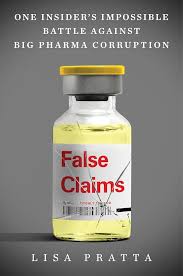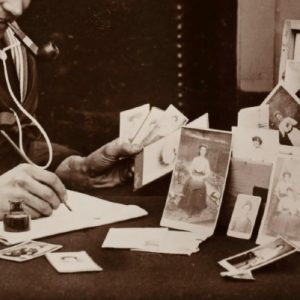For nearly ten years I was silenced. I was known only as Jane Doe, working in pharmaceutical sales undercover as whistleblower for the Department of Justice. It was a high-stakes tightrope I was walking, but no one in my life could know about it – not even my own family. On the outside, I kept up a good front. But inside, my heart felt like lead box: nothing could penetrate it, and nothing could escape. I suffered in silence, existing in survival mode. And now that I’ve survived, I finally get to tell my story.
Long before I became a whistleblower, I’d been conditioned to keep secrets. As a child, I was sexually abused by my father during an era when no one spoke about such things. I thought keeping pain inside equaled strength. So, for much of my career in big pharma, I kept quiet about the problems I encountered early on, like the industry’s rampant misogyny and sexual harassment. I didn’t speak out because I couldn’t risk getting fired: I was a single mother to a special-needs son. My health insurance provided the medication that kept him alive.
But then came a new job at a company called Questcor, where I was tasked with selling Acthar, a drug to treat Multiple Sclerosis. MS is a devastating neurological disease that strikes indiscriminately. I saw many formerly vibrant people, some only in their twenties, confined to wheelchairs. Some lost their vision, or the ability to speak. In some cases, patients lost all control of their bodies. For these people, Acthar was a last hope to reclaim any normalcy in their life. And in many cases, it could help – if prescribed correctly. But I was instructed to make sure it was prescribed incorrectly.
The official dosing of Acthar was a two to three week regimen. For some reason, Questcor told us to advise doctors to prescribe a reduced, five-day regimen. I knew my science, and this “off-label” dosing would not work. I didn’t understand why the company would recommend a sub-clinical dose, but I didn’t speak up. Instead, I did my own research and realized Questcor was using this strategy to compete with a cheaper drug on the market prescribed with an effective three-day dosage.
I was sure it wouldn’t take long for patients – and doctors — to realize the five-day regimen wasn’t effective, and that would be the end of that. But I was wrong. What happened was that whenever a patient or doctor questioned the efficacy of the drug, the corporate line was: “Well, if it’s not working, just add another dose.” With the additional doses, patients improved just enough to consider the drug helpful. And my employer made even more money.
It was almost unthinkable. My son depended on daily medication to function, and I couldn’t imagine someone purposefully prescribing him the wrong dose. So, I consulted a law firm. The attorneys told me that while I possibly had a case, the Department of Justice had a very high bar: they only pursued about five percent of the complaints that crossed their desk. My situation, however, was different than most: I was still employed at Questcor. Most whistleblowers were no longer working for the company they were reporting. My attorneys told me, “If the DOJ takes the case, you will become a qui tam relator – or ‘relator’ for short.” An undercover whistleblower.
I decided I had to at least try. So for the next few months, I gathered evidence for my attorneys to make our case to the DOJ. By day, I did my job: I met with my district manager, made doctor office visits, and coordinated patient care. At night, I sat home printing out copies of corporate emails and other evidence to share with my lawyers.
Then, in the midst of all this, I was diagnosed with cancer: stage three follicular lymphoma. It was as if my body was sounding the alarm, telling me that the situation I was in was toxic. After years of keeping so much inside, I suddenly had a stark understanding of the cost of silence.
When my doctor told me to reduce stress, I laughed. I couldn’t back out now: the DOJ took our case. Successful prosecution would depend on more evidence, and I was the only person who could supply this from the inside. So for the next seven years, I walked a tightrope of keeping my job while not breaking the law in the process. I made my daily physician calls and attended sales conferences, where I took note of accounts of bribes and fraud on cocktail napkins, the palm of my hand and sometimes on my own clothes. All the while, the case was “under seal,” meaning I was under court order not to talk to anyone at risk of losing any chance of prosecution.
Meanwhile, I still had my son to take care of and a job to do. I barely managed to keep up my sales quotas while competing with my colleagues who were paying off doctors. I was sure I’d be fired any day. And I was becoming increasingly isolated from my colleagues and closest friends. I couldn’t even talk to a therapist, because I couldn’t admit the true cause of my stress. When my cancer went into spontaneous remission, I made a promise to myself that once the case was over, I’d never be silenced again.
The DOJ finally brought their case against my employer, Questcor/Mallinkrodt, in 2019. The charges resulted in some hefty corporate fines, but none of the corporate executives responsible for the fraud were punished. In the end, the lawsuit didn’t solve the problem. But at least now my story is out, and the fight isn’t over.
We, as patients, must advocate for ourselves. This can be as simple as asking the right questions: Why are you prescribing this specific medication? What independent studies support this drug? Have you personally seen better outcomes with this medication compared to others? After my own experiences, I can honestly say that speaking up can be the difference between life and death. In today’s world, none of us can afford the high cost of silence.
Ultimately, my time as a whistleblower became about much more than exposing Big Pharma. It was also about liberating myself from fear, shame, and hurt I held inside for most of my life. When you keep quiet about even just a part of your life, all of you is silenced. Today, I can face my son knowing I not only did the right by him, but also myself. The lawsuit is finished, but my journey of healing has just begun.
***


















